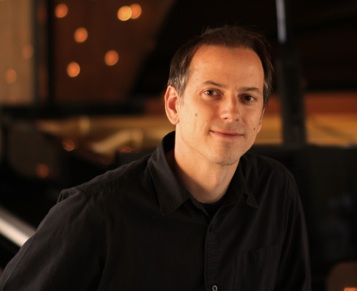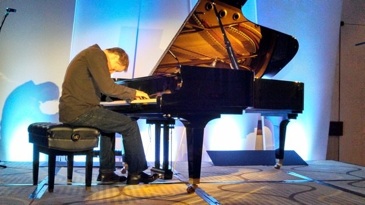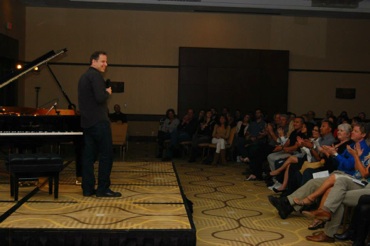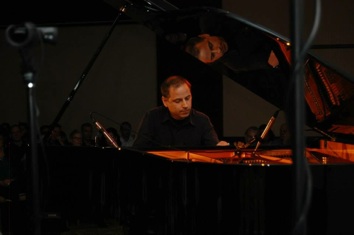Michael Logozar’s fourth solo piano album, Dreams From Afar, was released the end of March 2014 and is a wonderful combination of original compositions and Michael’s arrangements of three folk songs. Michael has become one of my favorite pianist/composers over the past several years and is coming to Florence, OR in May to perform as part of my house concert series. This seemed like an opportune time to do an interview, so here you go!
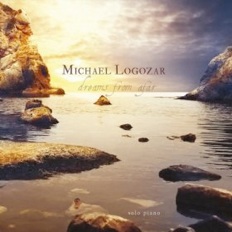
Click the album covers to read Kathy's reviews.
KP: You recently released Dreams From Afar, a collection of original solo piano compositions and arrangements of traditional folk songs. How is this album different from your previous recordings?
ML: The songs for my previous albums came about in a much more improvisational way and over a much longer period of time. For this one, my original intent was to record an album of my interpretations of folk songs and I wanted to complete it sometime before the end of 2014. My plans quickly changed when I accepted a challenge that was going around the music community to write, record and share seven songs in seven days. As intimidating as it was, I thought it would be a good thing to participate in. I liked the songs that came from it, and they had a very melodic feel to them that fit well with the folk songs I was already working on. In the end, I decided to merge the two ideas into one album.
That process taught me that creativity doesn't have to be a random inspiration, but that it can be an intentional act. The songs that came from this experiment are more concise, melodic and more composed rather than improvised. Also, I wrote the new songs with sheet music in mind because people had been telling me that some of my songs were too complicated. I worked to make this set of songs more accessible while hopefully keeping them interesting for more sophisticated listeners. Once the 7-in-7 challenge was completed, I finished up the three folk songs I’d been working on and then decided to write two more songs in the same quick fashion as the 7-in-7. Then I called the album complete.
KP: Your two previous releases, The Road Ahead (2013) and Time (2012), were both nominated for “Album of the Year” on Whisperings Solo Piano Radio. Is your new album being as well received as your earlier releases?
ML: It might still be too early to say, as I haven't done much promotion yet. I released this album before the radio promotion for my last album was completed, so I'll need to give it a bit more time. However, the couple of stations I've sent it to so far have all had really good feedback. I just heard back from Whisperings and they'll be adding the entire album to the playlist, which is a first for me.
KP: Congratulations! Time and The Road Home were both on my Favorites lists for the years they were released, and I fully expect Dreams From Afar to be on this year’s list. I love it! How did you choose the folk songs that you arranged?
ML: I went looking for public domain songs with strong melodies that hadn’t yet been widely covered by piano artists. I found “From afar returns my well-beloved” and “O ma Tendre Musette” in a really old folk song book. The song that I based "From Afar" on was really obscure. In fact, I can't find references to it anywhere online except in that one book. It's an old Lithuanian song that has a really sweet melodic hook but not much else (the chords don't change and the same line keeps going around and around like many folk songs do) - but it was enough to grab my attention. I wrote an arrangement based on the song, but added more sections and chord progressions to keep it interesting. Many folk songs are like that - just a verse that repeats over and over. I approached these songs almost as if I was a co-writer sitting in the room with the original composer, saying things like, "That's a great idea, now take it somewhere,” or “it needs a B section, or a chorus, or an interesting extra hook.” “The Water is Wide” got a whole new interlude that I attached to the melody, and “Musette” got an interesting intro hook that I kept bringing back.
KP: I really enjoy all of those along with the new pieces. You said you are working on the sheet music for Dreams From Afar as well. Do you plan to do an actual book for it or just downloads? Any idea of when that will become available?
ML: All of the sheets are done and for sale on my website in PDF format, and I have just ordered the first proof of the physical book for Dreams from Afar - I should have them available by the end of the month. I'm also in the process of getting caught up with transcribing the rest of my music and would like to have companion books for each album/CD by the end of the year.
KP: I can’t wait! We might as well as plug your house concert here on May 4th while we’re at it! That will be a Sunday afternoon at 3:00 here in Florence, OR. What do you have planned for us?
ML: I'm looking forward to it! So many great musicians have passed through your concert series. This will actually be my first complete solo concert. I usually play with one or two other pianists and am limited to five or six songs, so I'm looking forward to sharing a wider range of music.
KP: These “firsts” are always so exciting! We’re going to have a great time! Okay, let’s find out more about your background. Where were you born and where did you grow up?
ML: I was born in Edmonton, Alberta (Canada) and spent my childhood in the rural areas nearby. After high school, I moved to Calgary because I loved the mountains and perceived Calgary to be a warmer place than Edmonton, but fifteen long winters later, I found myself looking for a warmer climate. That's how I ended up in Texas.
KP: Are any other members of your family musicians?
ML: Yes, my dad and my siblings are all musicians in various forms. My mom learned some piano and music theory along side me to help with my lessons when I was young.
KP: That’s impressive! I’ve had a few parents take lessons with their kids - a really nice thing to share! How old were you when you started playing the piano? When did you start piano lessons, and how long did you take lessons?
ML: I’m told I started picking out popular melodies by ear on the piano when I was four years old. My parents saw some talent in me so they enrolled me in piano lessons by the time I was seven. I took classical lessons all the way from there through high school.
KP: Were you encouraged to improvise or compose by your piano teacher(s) or anyone else?
ML: My sister used to listen to me improvise on the piano at night, and I think she liked it, but other than that, I think generally it was seen as a distraction from the music I was supposed to be learning in my lessons. In the end it didn't stop me though, as the pull to write and improvise was too strong.
I remember multiple occasions when I'd spent more time improvising than practicing during the week, and I'd show up for my lesson and catch a quick glance at the teacher's notebook. If it said “Sonata,” I'd turn to the first page in the music book that said “Sonata” and start sight-reading it. Then she'd say, "Oh, that wasn't the right song - you were supposed to practice the other Sonata, but since you've been practicing this one, let's just keep working on it." Still, I'd like to find her and thank her someday because she really emphasized technique and making melodies sing out, and I think much of that has stuck with me to this day.
KP: I’m sure she’d love to hear from you and would be proud of the music you are doing now! I absolutely love hearing from former students and finding out what they are doing in life! Do you play other instruments?
ML: I can play guitar and often did when recording tracks for singers in my studio, but that's pretty much just rhythm acoustic and a little bit of electric guitar for adding atmosphere to a recording. Over the years, I've dabbled in a number of other instruments, too - banjo, bass guitar, hammered dulcimer, mandolin, various forms of percussion. My intention at the time was that I'd want to do all that when producing tracks for various types of music, but over time, technology has gotten so good and convincing that for many of those things I'd just end up working with samples on a computer and keyboard instead.
KP: How old were you when you started improvising?
ML: I started to feel the pull to improvising by the time I was 13 or so.
KP: How old were you when you wrote your first song?
ML: I don’t recall exactly, but I remember having a small collection of songs by the time I was 15 or 16 or so. One of the songs on my debut CD, Coming Into View, was actually from an old batch of songs I wrote when I was 19.
KP: Were you a music major in college?
ML: No, I came close though. I actually dropped out of music lessons just a couple weeks before my audition for the music program at the University of Victoria (BC), and a few weeks before my Grade 10 piano exams (not sure what the equivalent is in the US, but in Canada it was the last year before the official teaching certificate). At the time, I was getting a little frustrated with practicing three hours a day for eight months to prepare a half-dozen songs for adjudicators whose entire set of advice to me was to stop playing with my eyes closed and saying that I wasn't holding my chin right. So, from that point I just decided I'd do music for fun. In fact, the day after that decision, I went out and bought my first guitar. In the meantime, I enrolled in the Computer Science program instead.
KP: When did you start recording other artists?
ML: About five years into my technology career, I had a chance to build a recording studio and get back into some music. I was still holding onto a goal to record a piano CD and I thought this would help toward that end. However, I quickly found out that without a fantastic grand piano, a great room and lots and lots of good equipment, it wouldn't be feasible, so I turned my interest toward the production of music for other artists. Much of my work in this area was putting together backing tracks for singer/songwriters, but in any case, that was always just a part-time thing for me.
KP: What inspired you to start recording your own music?
ML: Well, it was a dream of mine probably back when I was 15 and the Narada and Windham Hill instrumental labels were in their prime. I took quite a detour, but sometime around 2004, the sampling technology started to catch up so that you could almost record a quality piano album on a computer and a midi controller. So I started collecting songs I was writing in that fashion and in 2007 I decided to put it all together for my first official piano CD. Once we moved to Texas, I had to shut down my studio in Canada and by the time I was a Whisperings artist, I decided my musical efforts would best be spent focusing on my own music. I traded a bunch of my equipment for a grand piano and have recorded the rest of my albums (and Kendra's newest two) on that.
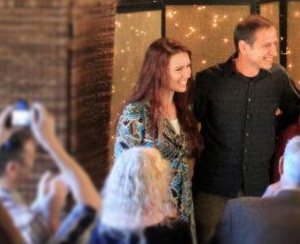
Kendra and Michael Logozar.
KP: When did you become a Whisperings Artist?
ML: It was in 2009, about a year after I released my first CD.
KP: I understand you met your wife, Kendra, at a Whisperings event. What happened?
ML: That particular Whisperings event also happened to be the very first house concert I ever hosted, and for that matter was my first ever concert after releasing my albums. I was living as a busy single parent of four young boys, 2000 miles away from any of my extended family, so getting out of the house was rare. I figured the only way I would ever get re-connected with the music community was to invite them into my life instead. My house has a suitable space for house concerts, so in spite of all the self-doubt that goes with trying something new, I reached out to Joe Bongiorno and David Nevue and let them know that I had a space to host house concerts. A couple months later, Joe called me back to say he was coming to Texas with David and Philip Wesley. We packed two shows of 40 people each into my place that day. David knew Kendra was one of the only other Texas-based Whisperings artists, so he invited her to the show. She was actually planning to attend their Houston show, but at the last minute came to mine instead. Our relationship blossomed after I produced her Faith CD a couple months later, and the rest is history.
KP: Great story! Do you perform in concerts very often?
ML: I am still busy with my other career as a technology consultant, so at this time, I just perform at the three or four house concerts a year that I host for other traveling pianists, and also try to get out to other locations a couple times a year wherever there’s a cluster of fans or an opportunity to perform with someone else whose music I like.
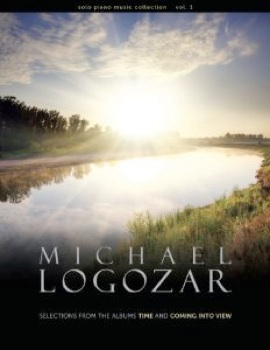
Michael's sheet music book. Click on the cover to read Kathy's review.
KP: I’m really glad you are making the trip to the Pacific Northwest next month! Do you have sheet music for many of your pieces?
ML: Currently, I have over half of my songs available and am working on completing my entire collection this year. In fact, as much as I want to write new songs, I've made a promise to myself to not do that until I make the rest of my songs available as sheet music, and until I learn to perform most of the rest of my music. It sounds strange to say so, but so many of my songs were either improvised or in the case of the recent 7-in-7, written so quickly that they came and went from my fingers and my memory as I moved on to other songs. In many cases, I have to go back over my recordings or transcribed sheet music to re-learn what I played the first time. I usually have other people transcribe my music, and generally it takes me longer to proof-read it than to write it in the first place. So it's a slow process, but I'm committed to getting caught up on this before I pursue creating more music.
KP: I hear this from a lot of composers - you are definitely not alone! Who or what are your biggest musical influences?
ML: That's a hard one for me to answer because I listen to such a broad variety of music, and ironically solo piano music is not something I listen to a lot of when I'm not writing/performing it myself. In my childhood, I was inspired toward this kind of music by people like David Lanz and Wayne Gratz, but in honesty, I didn't listen to that style much past the mid-90's. Currently, I find it neat to be able to revisit this music in the context of Whisperings or my own Pandora station. I also enjoy picking out the music of my new-found friends from the Whisperings concerts as the tracks come on, and am starting to recognize everyone's distinct styles.
KP: What inspired you to start composing your own music?
ML: I'm not really sure, except that every time I sit down at the piano there seems to be a melody or new pattern wanting to come out.
KP: Have you done any composing for films and/or TV?
ML: I have a couple dozen tracks placed in music libraries that have eventually landed on popular TV shows, but almost none of them are for my solo piano music. There’s one library I work with to provide custom cues for shows in production - when I have time. This is all generally electronic or pop-sounding music, though - there’s less of a market for pure solo piano on TV. Even though I do more than one style of music, I’ve chosen to focus on the piano albums as my main musical identity since I feel like it's how I connect with others the best.
KP: What has been your most exciting musical moment or experience so far?
ML: Performing at the Whisperings Awards show that was put together this year in Southern California was definitely one of them. The community that has formed around the Whisperings brand is wonderful, and I'm very grateful to David Nevue for his part in getting that whole scene started up again. It was great to be able to be with so many talented friends and perform for such a receptive audience.
KP: I hope to make it to next year’s event! Is there a particular philosophy that you try to convey in your music?
ML: I wish I had some deep wisdom to impart in this area, but I don't really know how to explain my music Many times it's just a way for me to relax and to play whatever I'm feeling. Sometimes I'm just playing around with ideas and patterns on the piano that sound good to me. One thing leads to another and before I know it, I have the beginnings of a song.
KP: Who are your favorite composers?
ML: I'm not really sure -- It's been 20 years since I've been immersed heavily in learning other people's music. Back then, it would have probably been Debussy, Chopin or Mendelssohn. I like the types of songs that have a lot of intricate motion going on but a very clear melody coming out every couple of notes -- subtle songs that are actually more difficult than they sound.
KP: Who are your favorite performers?
ML: Well, at the moment I'd say my favorite performers are many of the Whisperings people I've had a chance to perform with. I won't single any of them out specifically because each of them brings out something unique in their music and style and I enjoy the diversity that's there.
KP: Are any of your kids showing an interest in music yet?
ML: Yes, especially my youngest, but all of them to varying degrees. I'm enjoying hearing them pick out melodies by ear, so I'm hoping that's something I can encourage in them and foster in their development.
KP: If you could have any three wishes, what would they be?
ML: That's a hard one to answer because I'm happy right where I am right now.
KP: Lucky you! What’s up next for you?
ML: Well, ever since before my debut CD I've been involved in more than just solo piano. I have some unreleased cello/piano/guitar music that's probably eight years old by now, so I would possibly like to revisit that kind of music a bit. Initially, I just decided that if I was going to succeed at this, I should just pick one thing and do it well and not be all over the map, so that's why I chose to stay with solo piano. But after four albums, I might be ready to branch out a bit more and have some music that has other instrumentation on it. I'm not sure if that will be in the form of more radio-friendly edits of my current songs, or if it will be a new album, but I'd like to do something with strings on it. I would also like to record an album of hymns in the next year or two. And of course when the next 7-in-7 challenge hits this fall, that might derail all of my plans and maybe I'll have another solo piano record out the following month.
KP: Thanks for chatting, Michael! We’ll see you in a few weeks!
Many thanks to Michael Logozar for taking the time to tell us about his life and music. For more info about Michael, be sure to visit
his website as well as his
Artist Page here on MainlyPiano.com.
Kathy Parsons
April 2014

